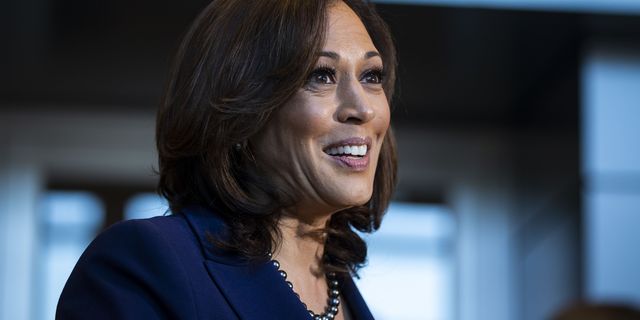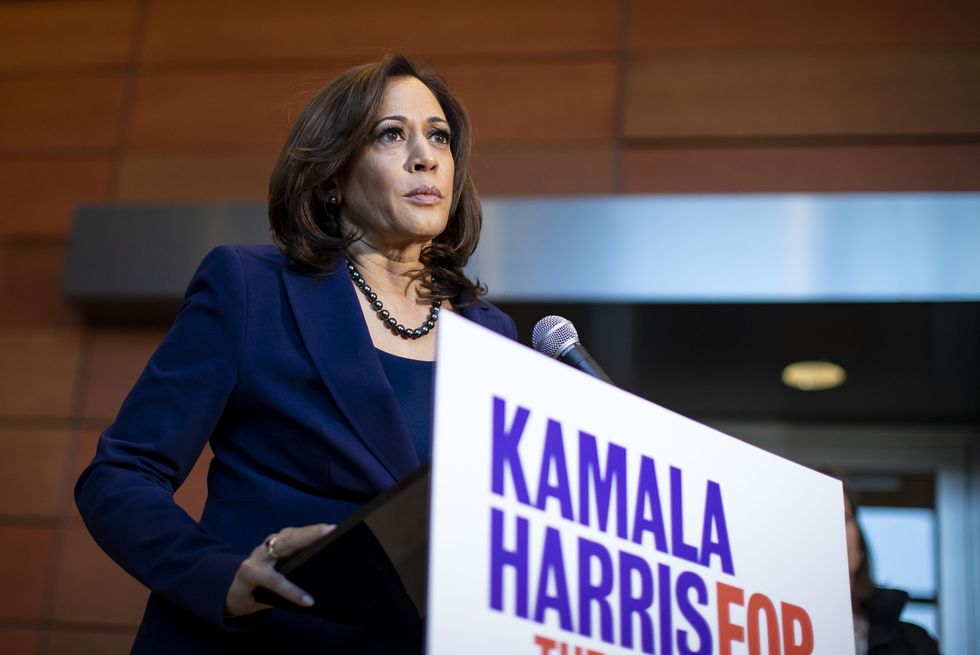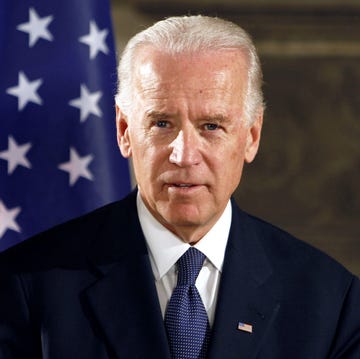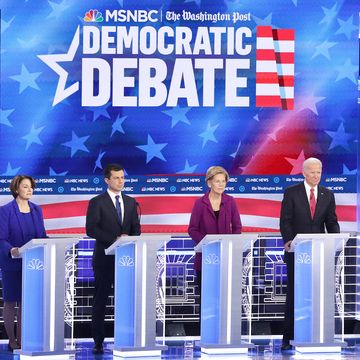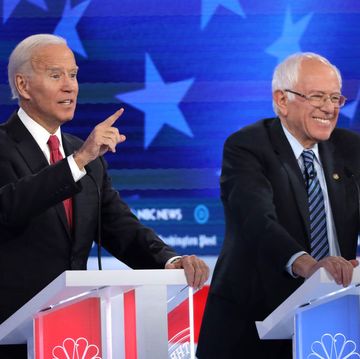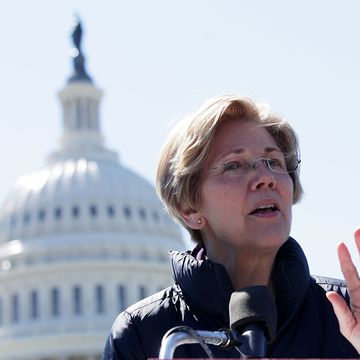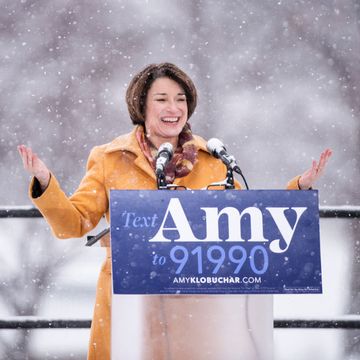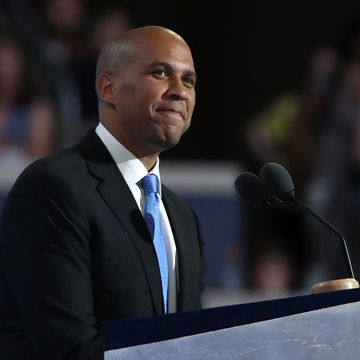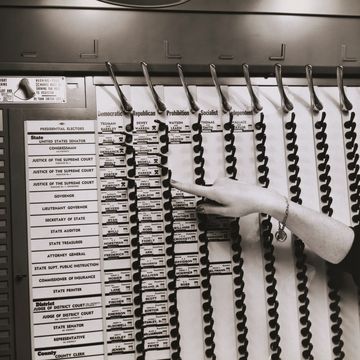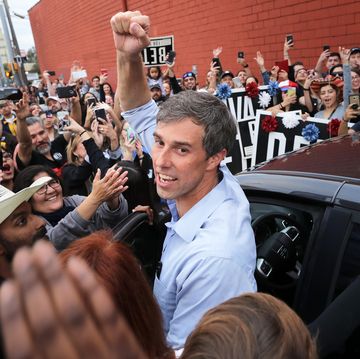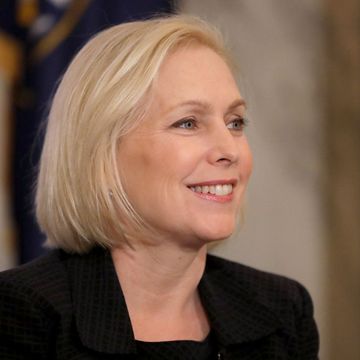Joe Biden and Kamala Harris have won the 2020 election and will be sworn in in January as the next president and vice president of the United States. When Biden announced Harris as his running mate, she became the first Black woman to be on a major party's presidential ticket in the United States, and now, she will become the first Black and Indian American woman to be vice president.
While the two have now formed a historic partnership, just last year, Harris was Biden’s rival. She also ran for president in the 2020 election, dropping out of the race in December 2019, though her career as an attorney general and senator made her an obvious choice for Biden’s VP.
Harris, 56, was born in Oakland to immigrant parents; her mother is originally from India, while her father is from Jamaica. After she graduated law school, Harris was a deputy district attorney before serving as the District Attorney of the City and County of San Francisco.
She then became the first Black person and the first woman to become California’s Attorney General, a position she held until 2016, when she ran to represent California in the U.S. Senate. She’s California’s first Black senator and the country’s first South Asian-American senator.
Below, ELLE.com breaks down where Harris stands on 12 issues, from healthcare to the COVID-19 pandemic.
Healthcare
In a 2018 piece for the New York Times, Harris wrote about her mother’s struggle with colon cancer and her support for the Affordable Care Act. She shared how she was one of the first senators to sign onto Sen. Bernie Sanders’ Medicare for All bill that was introduced in 2017. Harris wrote, “I believe that healthcare should be a right, but the reality is that it is still a privilege in this country. We need that to change.”
In July 2019, Harris released a more detailed look into her own Medicare for All healthcare plan. Her plan stated that all Americans would immediately have the ability to buy into Medicare. There would then be a 10-year phase-in period wherein newborns and the uninsured would be automatically enrolled into Medicare while giving others time to transition.
She would also allow private insurers to offer Medicare plans as part of this new system, as long as they "adhere to strict Medicare requirements on costs and benefits." Harris also wrote that her Medicare for All plan would expand the program to include other benefits, including expanded mental healthcare.
As a partial way to pay for the plan, Harris wrote she would "tax Wall Street stock trades at 0.2%, bond trades at 0.1%, and derivative transactions at 0.002%" and tax "offshore corporate income at the same rate as domestic corporate income." Find out more about the plan here.
The Economy
Harris has been critical of the Trump economy, saying in October 2018 that while unemployment was low pre-pandemic, there were still many American families struggling to stay afloat and that the economy “is not working for working people.” She’s also encouraged workforce training in order to prepare people for the future of automation.
In October 2019, Harris announced her “Children’s Agenda,” which included her proposal to create a national paid leave program that would guarantee up to six months of paid family and medical leave for all American workers, including part-time employees and independent contractors.
Through her plan, workers could take leave for serious health conditions, caring for new children, caring for family members with serious health conditions, and addressing any needs stemming from sexual assault or domestic violence.
The program would have been funded through a “combination of employer and employee payroll contributions and government expenditures paid for by tax increases on the top one percent and big corporations,” according to Harris’ team. Workers making less than $75,000 a year would receive full wage replacement with benefits phasing down for households with higher incomes.
Along with paid leave, the agenda also detailed her plan to pass a Child Care for Working Families Act so that families making under 150 percent of state median income would not spend more than seven percent of their income on child care.
During the pandemic, Harris was part of a group of senators who proposed providing $2,000 monthly payments to American families struggling due to COVID-19. She also announced the RELIEF Act, which would ban evictions and foreclosures for a year and prohibit landlords from raising rent, as well as the Saving Our Street Act, which would give grants of up to $250,000 to certain small businesses.
Women's Issues
During a speech at the 2017 Women’s March, Harris implored the nation to prioritize women’s issues, which she says include things like the economy, national security, healthcare, education, criminal justice reform, and climate change.
She’s also continuously been a pro-choice politician and has been supported by Planned Parenthood, including when she was announced as the vice presidential candidate.
During the 2020 Democratic primary debates, Harris also made a point to draw attention to the issue of reproductive healthcare. She said: “This is the sixth debate we have had in this presidential cycle. And not nearly one word, with all of these discussions about healthcare, on women’s access to reproductive healthcare, which is under full-on attack in America today. And it’s outrageous.”
She also confirmed her commitment to abortion rights when speaking about Trump's latest Supreme Court nominee, Amy Coney Barrett. Harris said that Trump and Barrett, as well as the Republican Party "have made clear that they want to overturn Roe v. Wade and restrict reproductive rights and freedoms." She continued: "Judge Barrett has a long record of opposing abortion and reproductive rights. There is no other issue that so disrespects and dishonors the work of Justice Ginsburg’s life than undoing the seminal decision in the court’s history that made it clear a woman has a right to make decisions about her own body." During the vice presidential debate, she did so again, saying, "I will always fight for a woman’s right to make a decision about her own body. It should be her decision and not that of Donald Trump and Vice President Michael Pence."
Harris, who also penned an essay on motherhood for ELLE.com, plans to tackle racial disparities in maternal health. “We cannot ignore the Black maternal health crisis that is happening in this country," Harris told ELLE.com. "Every day we wait and don’t address this issue is another day we allow more mothers to be at risk.”
During her presidential campaign, Harris also announced a plan to close the nationwide rape kit backlog. In her proposal, she planned to invest $1 billion to allow states to eliminate their backlogs within four years, as well as implement reforms to avoid backlogs in the future. Those reforms include requiring the testing of collected kits in a short time frame and giving victims the right to know the status of their kits.
COVID-19
Harris has criticized the Trump administration’s COVID-19 response for being slow and ineffective. When the United States’ death toll surpassed 100,000 in May, she released the following statement: “This administration’s glaring failures made this pandemic worse than it had to be. They downplayed the threat and failed to secure the testing kits, supplies, and personal protective equipment needed to save lives. The president himself has spread dangerous misinformation and conflicting messages; and has made clear that he is more concerned with deflecting blame and scoring political points than fulfilling his responsibility to protect public health. The Trump administration must start listening to the experts and following the science. Lives depend on it.”
U.S. data tracking the pandemic has showed that people of color, particularly Black Americans, are disproportionately dying from the virus. Harris formed a task force in response to “combat racial and ethnic disparities in COVID-19,” to address long-standing biases in the American healthcare system.
Harris also introduced a new piece of legislation this summer to “ensure health providers and other individuals involved in COVID-19 testing, treatment, vaccine distribution, and response receive bias and anti-racism training.” The COVID-19 Bias and Anti-Racism Training Act works to end racial and ethnic disparities that have emerged since the pandemic with a $200 million grant training program for healthcare facilities.
“People of color are being infected and dying from COVID-19 at disproportionate and astounding rates,” Harris said in a statement. “This is, in part, due to persistent bias in our healthcare system. We must take action to address this issue, especially as our country continues to face an unprecedented health crisis. I’m glad to partner with Representative Adams on this bill which is a critical step toward ensuring people—especially people of color—receive comprehensive, culturally competent care.”
In May, Harris teamed up with Rep. Ayanna Pressley to introduce a bill called “The Saving Our Street Act,” which would allocate grants of up to $250,000 to businesses with fewer than 10 employees impacted during the pandemic. Vox has more information on “Saving Our Street” here.
Immigration
The vice president-elect was vocally opposed to President Trump’s proposed U.S.-Mexico border wall, calling it a “vanity project.” On The View, she said, “By the way, because I was a prosecutor for many years, including the Attorney General of California, I specialize on trans-national criminal organizations. That wall ain’t gonna stop them.”
She’s also supported DREAMers and the Deferred Action for Childhood Arrivals program; in 2017, Harris said she would oppose any end-of-year government spending bills unless Congress acted to protect young people affected by DACA. In June 2019, she also announced an immigration plan that would have used “executive actions to remove the threat of deportation of millions of undocumented people,” according to CNN.
Before she got to D.C., Harris had a long record of immigration work: While working in San Francisco, she started a job training program for ex-convicts that allowed undocumented immigrants to participate. (She has said before that illegal immigration is “a civil violation, not a crime.”) In California, she also helped create legislation that would protect immigrants who reported or testified about crimes from deportation.
Sex Work
Last year, Harris told The Root in an interview that she supports the decriminalization of sex work, which some have called a "massive shift" from her time as a prosecutor.
“There is an ecosystem around that that includes crimes that harm people, and for those issues, I do not believe that anybody who hurts another human being or profits off of their exploitation should be free of criminal prosecution,” Harris told The Root. “But when you’re talking about consenting adults, we should consider that we can’t criminalize consensual behavior.”
According to Rolling Stone's EJ Dickson, Harris has a reputation as an "antagonist of sex workers," opposing the decriminalization of prostitution in San Francisco in 2008 and cosponsoring SESTA/FOSTA. Among her harshest critics, according to Dickson, are sex workers’ rights advocates, who are speaking out about her past track record.
The LGBTQ+ site them. has an in-depth guide to Harris's record on sex workers' rights and the trans community here.
Gun Policy
Harris has supported a ban on assault weapons and on the sale of high-capacity magazines. While Attorney General, she also introduced a California-wide sweep to seize illegally-owned firearms; more than 1,200 firearms were ultimately collected.
“There are people in Washington, D.C., supposed leaders who have failed to have the courage to reject a false choice which suggests you’re either in favor of the second amendment or you want to take everyone’s guns away,” Harris said during a town hall on CNN in April 2019. “We need reasonable gun safety laws in this country, starting with universal background checks and a renewal of the assault weapon ban, but they have failed to have the courage to act.”
At the town hall, Harris said that, if she were president, she would have signed an executive order “mandating background checks for customers of any firearms dealer who sells more than five guns a year.” According to the New York Times, her proposed executive actions would have also increased regulations of gun manufacturers and tried to close a loophole that allows some domestic abusers to purchase guns.
Criminal Justice Reform and Policing
In the wake of the police killing of George Floyd, Harris has been vocal about police misconduct, expressing her frustrations about Breonna Taylor’s case on Twitter, writing: “The officers who murdered Breonna Taylor nearly three months ago still have not been charged. We can’t forget about Black women in our quest for justice.”
When 19-year-old Black Lives Matter activist Oluwatoyin Salau was found dead, Harris sent out a tweet memorializing her: “Heart-wrenching. Oluwatoyin Salau used her voice to fight for the Black community and speak out against injustice. She was only 19 and had her whole life ahead of her. We must do better to protect Black women and value their lives. #JusticeForToyin.”
During her speech at the Democratic National Convention, Harris told the nation: "And let’s be clear: There is no vaccine for racism. We have got to do the work. For George Floyd. For Breonna Taylor. For the lives of too many others to name. For our children. And for all of us. We’ve gotta do the work to fulfill that promise of equal justice under law. Because, here's the thing, none of us are free until all of us are free."
When asked about defunding the police during an appearance on The View, she said: "We have confused the idea that to achieve safety, you put more cops on the street instead of understanding to achieve safe and healthy communities." She continued, "You know, in many cities in America, over one-third of their city budget goes to the police. So, we have to have this conversation, what are we doing? What about the money going to social services? What about the money going to helping people with job training? What about the mental health issues that communities are being plagued with for which we’re putting no resources?"
Then, during the vice presidential debate, Harris said: "Bad cops are bad for good cops. We need reform of policing in America and our criminal justice system. That's why Joe and I will immediately ban chokeholds and carotid holds."
Recently, Harris has marched at rallies and introduced an anti-lynching law. Still, some say she will have to reconcile with her own record from her time as a prosecutor. According to the New York Times, she largely “avoided intervening in cases involving killings by the police” when she was California’s attorney general. Over time, she has said her attitudes toward criminal justice have shifted, but took “baby steps when bold reform was needed,” according to the New York Times. The newspaper took an in-depth look at her positions on policing here.
Foreign Affairs
In 2018, Harris was one of the Democratic senators who signed a letter to Trump saying he did not have the authority to order a preemptive strike against North Korea without permission from Congress. She has also criticized Trump’s strategy in the past, saying, “My concern is that we cannot conduct our foreign policy through tweets.”
She told the Council on Foreign Relations that she “won’t be exchanging love letters with Kim Jong-un. President Trump has handed Kim one PR victory after the next, all without securing any real concessions, so the next president will have serious work to do.”
Harris has also been vocal about disagreeing with how Trump decided to withdraw troops from Syria, a move that contributed to the resignation of former Secretary of Defense James Mattis.
She spoke in-depth to the Council on Foreign Relations about American relations with China, Iran, Syria, and North Korea here.
Climate Crisis
Harris supports the Green New Deal and wants to build a “clean economy” that creates jobs. Last year she revealed a plan calling for $10 trillion in public and private funding to build infrastructure, clean energy, and climate resilience measures—which she said will create millions of new jobs. Not only did the plan call for net-zero carbon emissions by 2045, it also called for a carbon-neutral electricity sector by 2030.
She also told the Council on Foreign Relations that she would “rejoin the Paris Agreement, so that the world understands America is serious about meeting the most complex, far-reaching challenge of our time—climate change.”
While campaigning for president last year, Harris promised to “hold polluters accountable for the damage they inflict upon our environment and set us on a path to a 100 percent clean economy that creates millions of good-paying jobs.” The climate crisis, she added, “demands urgency and boldness.”
Recently, Harris visited a town in California that was "largely leveled by the Creek Fire" this September, according to the San Francisco Chronicle. There, she said, "Sadly, these wildfires and the devastation they cause are utterly predictable. This is not a partisan issue. This is just a fact. We have to do better as a country."
Income and Wealth Distribution
Harris is for a $15/hour minimum wage, saying she believes the minimum wage should be a living wage, and she’s advocated for equal pay between men and women, as well as a federally mandated paid family and sick leave.
In a 2017 essay for Teen Vogue, she wrote, “Our daughters should not grow up believing that their work is worth less than a man’s. It’s time to end this fundamental unfairness. It’s time to make equal pay a reality for all Americans.”
Last year Harris, then a presidential hopeful, released a detailed plan to invest in HBCUs and Black entrepreneurship. Her plan included an investment of $60 billion in STEM education at HBCUs and other MSIs (minority serving institutions). Of that $60 billion, $10 billion would go toward an infrastructure grant program for HBCUs and other MSIs, and $50 billion would go toward a Department of Education fund to help HBCUs and MSIs build up their STEM education.
In a May interview with Essence, Harris, a Howard University graduate, said that “HBCUs have produced so many doctors and scientists, and those labs, because they don’t have the kinds of endowments that other schools have, have not necessarily caught up." She continued, "When we have research, medical and scientific research, happening at HBCUs, it acts as a function for all the people who come for treatment to those hospitals and helps our awareness then, of cultural and genetic factors.”
“If you look at the facts and the data, it shows that if a Black child by the end of third grade has had a Black teacher, they’re 13 percent more likely to go to college. If that child has had two Black teachers, they’re 32 percent more likely to go to college. So we need to put money into HBCUs to encourage and create grants for students to become teachers, because I know the generational impact of that.”
Taxes
A few months before Harris announced her intentions to run for president, she proposed a plan to give a tax credit to the middle-class, called the LIFT the Middle Class Act. The bill offered up to $3,000 a year (or $250 a month) to single people, while married couples would get up to $6,000 a year (or $500 a month). The credit would be available to couples that earn under $100,000 a year or singles who earn less than $50,000 a year. (Learn more about LIFT here.)
According to Politico, Harris said: “We should put money back into the pockets of American families to address rising costs of childcare, housing, tuition and other expenses. Our tax code should reflect our values and instead of more tax breaks for the top 1 percent and corporations, we should be lifting up millions of American families."
She’s also proposed the Rent Relief Act, which would give a tax credit to certain people who spend more than 30 percent of their income on rent. The bill has been criticized for being favorable to landlords, since people could end up spending even more of their money on rent, and because it doesn’t do anything to address the current supply of housing.
Learn more about her comprehensive tax plan here.
And one more thing…
Harris will have to reckon with her past record as a prosecutor, district attorney, and attorney general. According to Vox, that record is complicated: “She pushed for programs that helped people find jobs instead of putting them in prison, but also fought to keep people in prison even after they were proved innocent. She refused to pursue the death penalty against a man who killed a police officer, but also defended California’s death penalty system in court. She implemented training programs to address police officers’ racial biases, but also resisted calls to get her office to investigate certain police shootings.”
"The bottom line is the buck stops with me and I take full responsibility for what my office did," she said last year. "There are cases…where there were folks that made a decision in my office and they had not consulted me and I wish they had."
This will continue to be updated.
